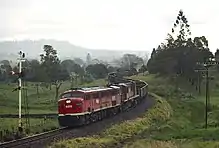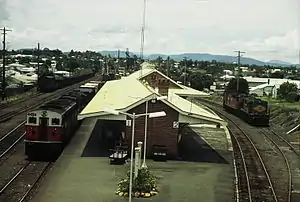Sydney–Brisbane rail corridor
The Sydney–Brisbane railway corridor is a 1,008.25 kilometres (626.50 mi) long standard gauge railway corridor that connects the state capitals of Brisbane and Sydney in Australia.[1]


Description
The corridor consists of the first 196 kilometres (122 mi) of the Main North Line from Sydney Central to Maitland, and then the entire 812.25 kilometres (504.71 mi) of the North Coast line to Roma Street, Brisbane.
The NSW TrainLink XPT passenger service operates along the route, as do a number of other freight and passenger services.
History
Originally the corridor was made up of the Queensland Rail narrow gauge Southern line and the New South Wales Government Railways standard gauge line that met at Wallangarra at a break-of-gauge in 1888. It was not until 1930 that the coastal, standard gauge North Coast line was extended from Casino to Brisbane making through services possible,[2][3] using a rail ferry for the river crossing in Grafton until the Grafton Bridge opened in 1932.[4]
The old Main Northern railway line which went to Wallangarra now terminates near Armidale.
Gallery
 44216 and another haul the northbound Brisbane Limited across the Corinda line at Yeerongpilly in 1987
44216 and another haul the northbound Brisbane Limited across the Corinda line at Yeerongpilly in 1987 44238 & 4470 haul a northbound goods train cross Beaudesert Road, Acacia Ridge, 1987. This crossing has since been replaced by an overpass
44238 & 4470 haul a northbound goods train cross Beaudesert Road, Acacia Ridge, 1987. This crossing has since been replaced by an overpass 4479 and a 45 class haul a southbound train past Mt Lion, on the Brisbane-Casino line, 1987
4479 and a 45 class haul a southbound train past Mt Lion, on the Brisbane-Casino line, 1987
 4479 and a 45 class haul a southbound goods train through the S bend south of Kyogle station, 1987
4479 and a 45 class haul a southbound goods train through the S bend south of Kyogle station, 1987 4479 and a 45 class haul a goods train about to exchange electric staffs at Fairy Hill, north of Casino, 1987
4479 and a 45 class haul a goods train about to exchange electric staffs at Fairy Hill, north of Casino, 1987 4456 and a 45 class haul a southbound goods train through Casino station, 1987
4456 and a 45 class haul a southbound goods train through Casino station, 1987 44231 on a northbound freight train arriving at Casino in 1987
44231 on a northbound freight train arriving at Casino in 1987
See also
- Northern Sydney Freight Corridor – a package of capacity improvements between Sydney and Newcastle
References
Citations
- "AusLink Network Corridors". AusLink. Archived from the original on 19 July 2008. Retrieved 29 March 2008.
- "History of Rail in Australia". Department of Infrastructure, Transport, Regional Development and Local Government. Retrieved 29 March 2008.
- "North Coast Line". NSWrail.net. Retrieved 8 April 2008.
- "Additional Crossing of the Clarence River – Feasibility Study Report" (PDF). Roads & Traffic Authority. February 2003. Archived from the original (PDF) on 10 April 2011. Retrieved 8 April 2008. p1
Sources
- Avery, Rod (2006). Freight Across the Nation: The Australian Superfreighter Experience. Brisbane: Copyright Publishing Co. ISBN 1876344474.